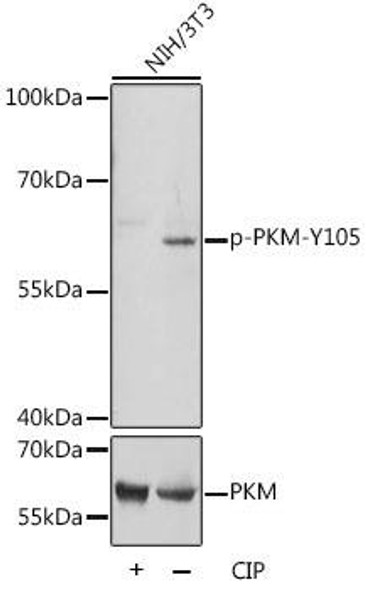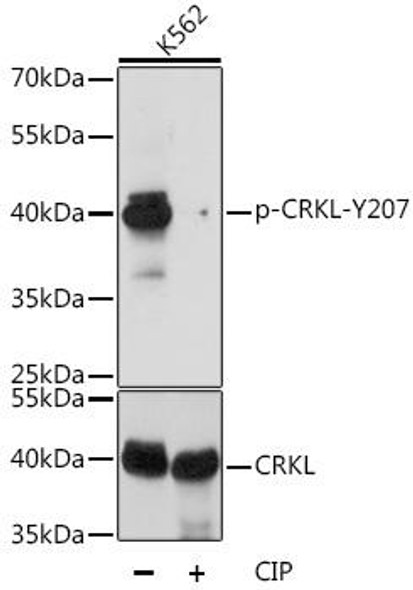Metabolism Antibodies 3
Anti-Phospho-PKM-Y105 pAb Antibody (CABP0875)
- SKU:
- CABP0875
- Product Type:
- Antibody
- Applications:
- WB
- Reactivity:
- Human
- Host Species:
- Rabbit
- Isotype:
- IgG
- Research Area:
- Metabolism
Description
| Antibody Name: | Anti-Phospho-PKM-Y105 Antibody |
| Antibody SKU: | CABP0875 |
| Antibody Size: | 20uL, 50uL, 100uL |
| Application: | WB |
| Reactivity: | Human |
| Host Species: | Rabbit |
| Immunogen: | A phospho specific peptide corresponding to residues surrounding Y105 of human PKM |
| Application: | WB |
| Recommended Dilution: | WB 1:500 - 1:1000 |
| Reactivity: | Human |
| Positive Samples: |
| Immunogen: | A phospho specific peptide corresponding to residues surrounding Y105 of human PKM |
| Purification Method: | Affinity purification |
| Storage Buffer: | Store at -20°C. Avoid freeze / thaw cycles. Buffer: PBS with 0.02% sodium azide, 50% glycerol, pH7.3. |
| Isotype: | IgG |
| Sequence: | Email for sequence |
| Gene ID: | 5315 |
| Uniprot: | P14618 |
| Cellular Location: | Cytoplasm, Nucleus |
| Calculated MW: | 56kDa/57kDa/58kDa |
| Observed MW: | Refer to figures |
| Synonyms: | CTHBP, HEL-S-30, OIP3, PK3, PKM2, TCB, THBP1, PKM |
| Background: | This gene encodes a protein involved in glycolysis. The encoded protein is a pyruvate kinase that catalyzes the transfer of a phosphoryl group from phosphoenolpyruvate to ADP, generating ATP and pyruvate. This protein has been shown to interact with thyroid hormone and may mediate cellular metabolic effects induced by thyroid hormones. This protein has been found to bind Opa protein, a bacterial outer membrane protein involved in gonococcal adherence to and invasion of human cells, suggesting a role of this protein in bacterial pathogenesis. Several alternatively spliced transcript variants encoding a few distinct isoforms have been reported. |
| UniProt Protein Function: | PKM2: one of three rate-limiting enzymes in glycolysis. It catalyzes the transfer of a phosphate group from phosphoenolpyruvate (PEP) to ADP, yielding one molecule ATP and a pyruvate molecule, which is a central metabolic intermediate that can be used as a building block or oxidized further. Overexpressed in a variety of cancers. Interacts with thyroid hormone, and thus may mediate cellular metabolic effects induced by thyroid hormones. Binds Opa protein, a bacterial outer membrane protein involved in gonococcal adherence to and invasion of human cells, suggesting a role of this protein in bacterial pathogens is. There are several mammalian isozymes of pyruvate kinase encoded by different genes. The L type predominates in liver, and the M type in muscle and brain. Two alternatively spliced human isoforms of PKM2 have been reported. |
| UniProt Protein Details: | Protein type:Carbohydrate Metabolism - glycolysis and gluconeogenesis; Kinase, other; EC 2.7.1.40; Carbohydrate Metabolism - pyruvate; Mitochondrial; Nucleotide Metabolism - purine Chromosomal Location of Human Ortholog: 15q22 Cellular Component: extracellular matrix; mitochondrion; cytoplasm; plasma membrane; nucleus; cytosol; vesicle; cilium Molecular Function:potassium ion binding; protein binding; magnesium ion binding; pyruvate kinase activity; ATP binding Biological Process: glycolysis; carbohydrate metabolic process; programmed cell death; glucose metabolic process; pathogenesis; phosphorylation |
| NCBI Summary: | This gene encodes a protein involved in glycolysis. The encoded protein is a pyruvate kinase that catalyzes the transfer of a phosphoryl group from phosphoenolpyruvate to ADP, generating ATP and pyruvate. This protein has been shown to interact with thyroid hormone and may mediate cellular metabolic effects induced by thyroid hormones. This protein has been found to bind Opa protein, a bacterial outer membrane protein involved in gonococcal adherence to and invasion of human cells, suggesting a role of this protein in bacterial pathogenesis. Several alternatively spliced transcript variants encoding a few distinct isoforms have been reported. [provided by RefSeq, May 2011] |
| UniProt Code: | P14618 |
| NCBI GenInfo Identifier: | 20178296 |
| NCBI Gene ID: | 5315 |
| NCBI Accession: | P14618.4 |
| UniProt Secondary Accession: | P14618,P14786, Q53GK4, Q96E76, Q9BWB5, Q9UCV6, Q9UPF2 A6NFK3, B2R5N8, B3KRY0, B4DFX8, B4DUU6, |
| UniProt Related Accession: | P14618 |
| Molecular Weight: | |
| NCBI Full Name: | Pyruvate kinase PKM |
| NCBI Synonym Full Names: | pyruvate kinase, muscle |
| NCBI Official Symbol: | PKM |
| NCBI Official Synonym Symbols: | PK3; TCB; OIP3; PKM2; CTHBP; THBP1; HEL-S-30 |
| NCBI Protein Information: | pyruvate kinase PKM; p58; OIP-3; tumor M2-PK; PK, muscle type; pyruvate kinase 2/3; OPA-interacting protein 3; pyruvate kinase isozymes M1/M2; pyruvate kinase muscle isozyme; thyroid hormone-binding protein 1; epididymis secretory protein Li 30; cytosolic thyroid hormone-binding protein; thyroid hormone-binding protein, cytosolic |
| UniProt Protein Name: | Pyruvate kinase PKM |
| UniProt Synonym Protein Names: | Cytosolic thyroid hormone-binding protein; CTHBP; Opa-interacting protein 3; OIP-3; Pyruvate kinase 2/3; Pyruvate kinase muscle isozyme; Thyroid hormone-binding protein 1; THBP1; Tumor M2-PK; p58 |
| Protein Family: | Pyruvate kinase |
| UniProt Gene Name: | PKM |
| UniProt Entry Name: | KPYM_HUMAN |






